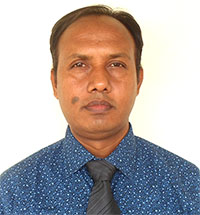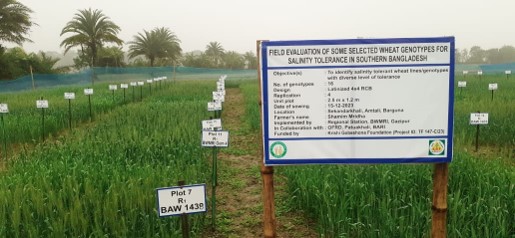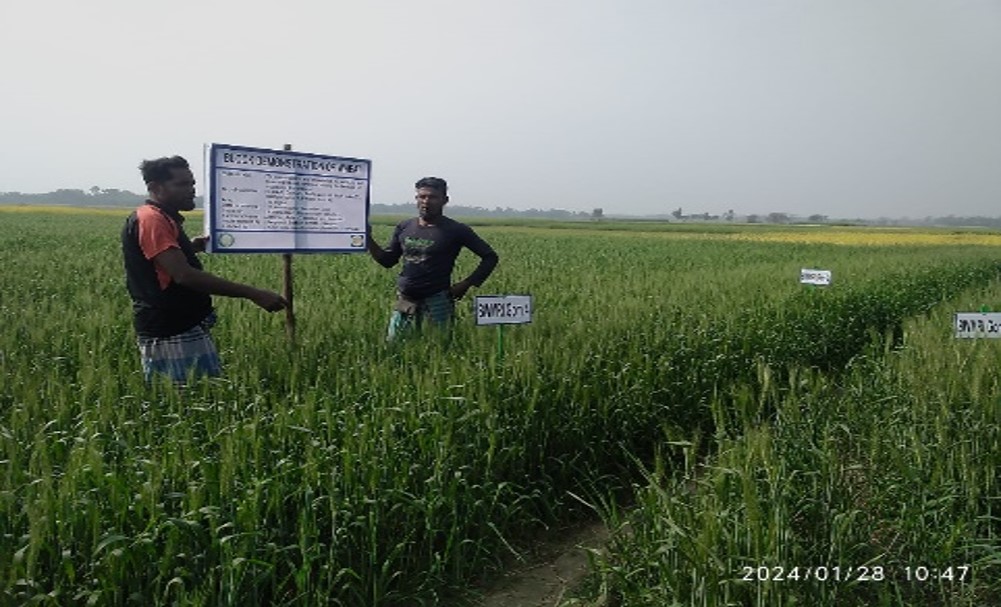Evaluation and expansion of salt tolerant wheat genotypes in the coastal areas of Bangladesh
Wheat is the second important cereal crop next to rice in Bangladesh as human food. At present, wheat demand is about 7.5 million MT against the production of about 1.085 million MT. The scope of expansion of wheat cultivation in traditional areas i.e. north region of the country is difficult due to crop competition. To reduce this gap between production and demand, wheat cultivation should be expanded to the salt affected fallow lands (1.056 M ha) in coastal regions. It is imperative to develop and promote salt-tolerant wheat lines and varieties among the farmers of coastal region. In the past, inadequate research attention has been given in this regard due to fund crisis. Therefore, the present project has been undertaken in order to evaluate and select high yielding salinity wheat lines/varieties and disseminate among the farmers of the coastal region to increase wheat production
A total of 100 wheat genotypes were evaluated under hydroponic system at Gazipur at 0, 5, 10 and 15 dS m-1 salinity in the 1st year and the selected 50 genotypes were tested in the 2nd year both at hydroponic (0 and 15 dS m-1 salinity) and field at Barguna. In the 1st year and 2nd year 2 sets of trials have been conducted with advance wheat lines developed by BWMRI and germplasm collected from CSIRO, Australia at salt affected coastal areas of Patuakhali and Barguna Districts. There were two field trials and one lab screening in the first year (2023-2024).The 2nd year field trials and lab screening are underway. Salinity levels are being measured and monitored at the experimental field at regular intervals. There were wheat seed dissemination activities through fifty variety demonstrations and two wheat block demonstrations. Wheat seed dissemination activities are ongoing this year through variety demonstrations. Training program on wheat production and seed preservation has been provided to farmers associated with this activities
In the first year, out of 100 genotypes 50 genotypes were selected based on their good dry matter production in early vegetative stage for further evaluation in same hydroponic system and in the salt affected field of coastal area in the 2nd year. The 2nd year evaluations are ongoing in the field and laboratory. From the first year two field trials, 2 wheat genotypes namely BAW 1425 and BAW 1435 from BWMRI source and one Australian genotype namely CSVig-2020-B11 were selected as salt tolerant based on their higher yield attributes & less response to salinity. These trials are also going on this year to confirm first year results. There was significant salinity range (4.1- 14.4 dS m-1) in the trial field throughout the growing season. From the seed dissemination activities of first year, about two metric ton seeds have been preserved by the farmers to sell and for own use in the next year.
The results of the first year activities are highly encouraging. It is expected that few high yielding salinity tolerant wheat genotypes will be selected from such research activities. We also hope that quality seed of the existing salinity tolerant varieties will become available among the wheat farmers of this region.
Training have been provided to one hundred farmers on wheat cultivation and seed preservation from the project fund. Moreover, related wheat farmers will know about the new salt tolerant lines and varieties for quick adoption. The trained farmers can also share this technical know-how on wheat production and seed preservation to neighbouring farmers. The trained farmers will be aligned with BWMRI’s national program. Some farmers are benefitted by selling their preserved wheat seeds of new wheat varieties.
Output of the projects will help to enrich salt tolerant wheat germplasms of BWMRI and develop salt tolerant wheat variety. The research protocol for developing salinity tolerant wheat genotypes will be adopted by national breeding program of BWMRI.



